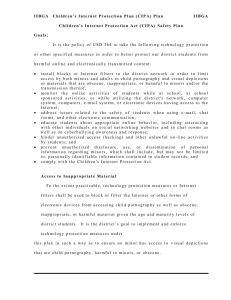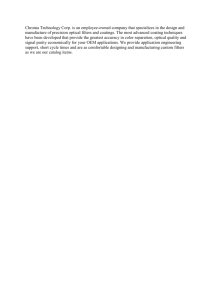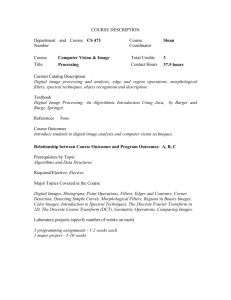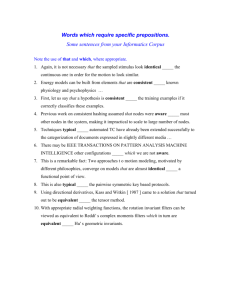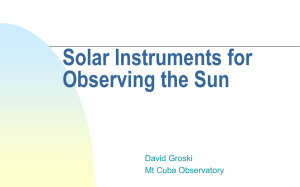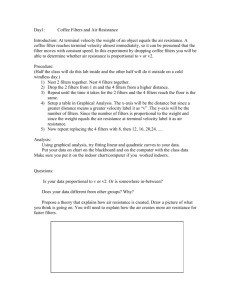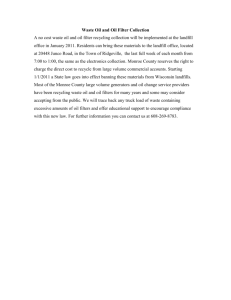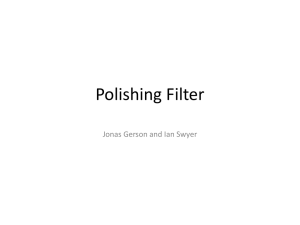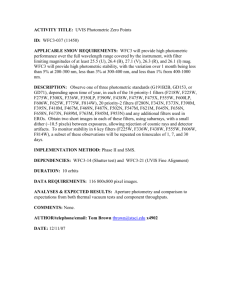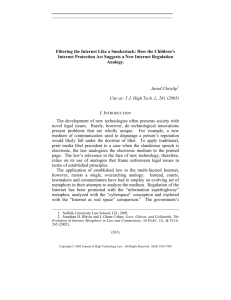Sampler 1 - MrGibbs.com
advertisement
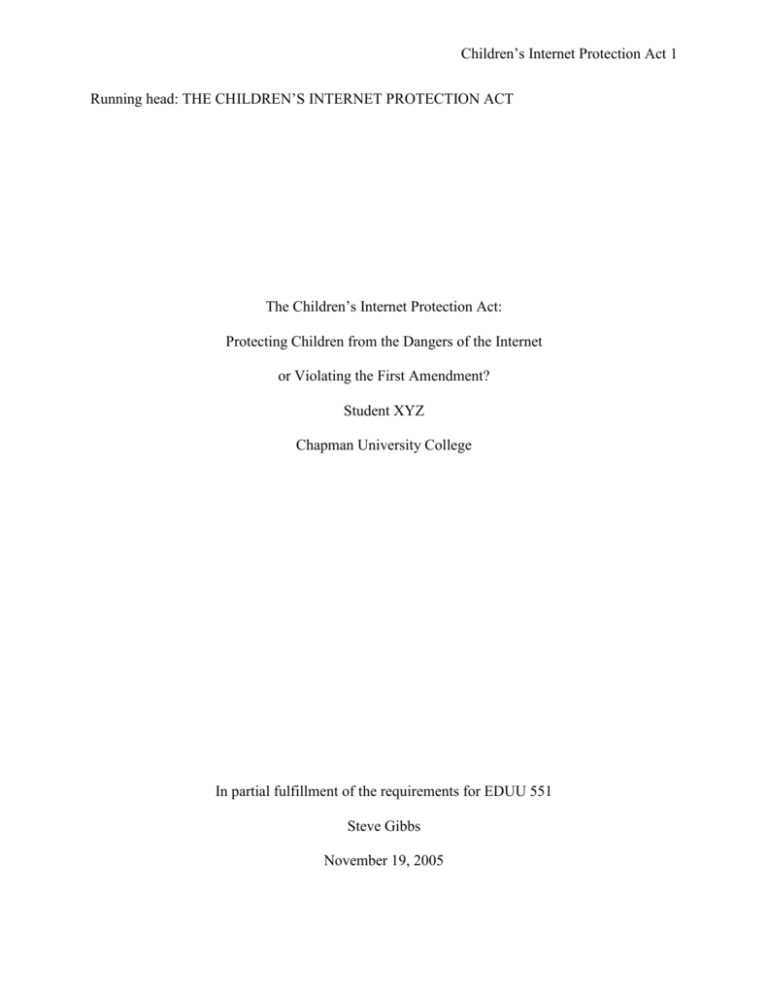
Children’s Internet Protection Act 1 Running head: THE CHILDREN’S INTERNET PROTECTION ACT The Children’s Internet Protection Act: Protecting Children from the Dangers of the Internet or Violating the First Amendment? Student XYZ Chapman University College In partial fulfillment of the requirements for EDUU 551 Steve Gibbs November 19, 2005 Children’s Internet Protection Act 2 Abstract The Children’s Internet Protection Act (CIPA) was passed by the United States Congress with the goal of protecting children from pornography and other inappropriate content on the Internet. It states that all schools and public libraries must use Internet filters on their computers in order to receive vital government funded “E-rate” discounts for computer equipment and services. Internet filtering is an imperfect method for protecting children from dangerous material on the Internet. In addition, Internet filters in public places also affect adults, and there has been great debate over whether CIPA violates the First Amendment right to free speech. Children’s Internet Protection Act 3 The Children’s Internet Protection Act: Protecting Children from the Dangers of the Internet or Violating the First Amendment? The Children’s Internet Protection Act (CIPA) was passed by Congress in December 2000 with the goal of protecting children from pornography and other dangerous content on the Internet. It requires that all schools and public libraries use Internet filters to block “obscenity, child pornography, and content harmful to minors” (Jaeger & McClure, 2004). Schools or public libraries that do not comply with CIPA cannot receive vital, federally funded “E-rate” discounts for computer equipment and services. Although protecting children from the dangers of the Internet may be good policy, Internet filters are flawed. In addition, many say that CIPA violates the First Amendment right to free speech. Internet filters have not yet been perfected, and they cause problems in both schools and public libraries: they often filter out important or harmless information while failing to block all the objectionable content that they should. According to the Electronic Freedom Foundation, schools that use the least restrictive filters will block between 0.5% and 5% of search results based on state-mandated curriculum topics, 1.4% of health related sites, and 87% of pornographic sites. At the other extreme, the most restrictive filters will block 70% of search results based on state-mandated curriculum topics, 24 % of health information, and only 91% of pornographic sites (Johnson, 2005). This illustrates that, no matter how they are set up, filters will inevitably block useful information while allowing pornography to slip through; it is virtually impossible for filters to keep up with the millions of web pages that change their content daily. Children’s Internet Protection Act 4 Doug Johnson, longtime Director of Media and Technology for area schools in Minnesota, makes some useful suggestions about how to use filters effectively in public schools. Since filters have the tendency of over-blocking content, he uses the least restrictive settings while still complying with CIPA; he only blocks 2 of 14 categories on the schools’ filters: “sexual acts” and “gross sexual depictions.” He also makes sure that teachers and administrators can easily unblock any restricted sites. Most importantly, he points out that parents and teachers still need to be vigilant about what children are doing on the computer: if even the most restrictive filters only filter out 91% of pornography, students can find a way to access it. He says that students at his schools are taught about appropriate and ethical use of the computer, and teachers continue to monitor students on the computers even though the computers have filters. In addition to the fact that Internet filters are flawed, many people dislike CIPA because they believe that it violates the First Amendment right to free speech. In fact, in 2002 a three judge panel in a U.S. District Court declared CIPA unconstitutional (American Library Association v. United States). However, the Supreme Court later overturned the ruling in 2003 (United States v. American Library Association). Two of the reasons that the courts originally declared CIPA unconstitutional are that it does not define clearly what “harmful to minors” means and that it affects adults in public libraries, who should have the right to view almost all content even if minors cannot. CIPA requires that filters in schools and public libraries block “obscenity, child pornography, and content harmful minors,” but it does not define what “harmful to minors” means. Both “obscenity” and “child pornography” have been defined in the past, and they have a long history of being controlled or banned in the United States. On the other hand “harmful to minors” is a nebulous term, and there is no precedent on how the term should be applied. This is dangerous Children’s Internet Protection Act 5 because school staff and librarians are then left to decide what it means, and they may apply the term however they want; for example, they could decide that websites about religions of the world or sexually transmitted diseases are “harmful to minors.” They could even go so far as to say that Romeo and Juliet is harmful because of its sexual content or its discussion of suicide. In addition, filters block the same content for all minors, although what may be inappropriate for a 5 year old may be appropriate for a 17 year old, such as information about sexually transmitted diseases. Another way in which CIPA might violate the First Amendment is that it affects adults in public libraries. Under CIPA, adults have the right to request that filtered websites be unblocked for “bona fide research or other lawful purposes” (Jaeger & McClure 2004). However, there are many problems with this, one of them being that, once again, the terms are not well defined. Adults may not be aware that filters are on while they are doing Internet research at public libraries, and they may not be aware that they have the right to ask that websites be unblocked. They may also be discouraged from asking a librarian to unblock a site out of embarrassment, and the library staff may not even know how to adjust filter settings. In addition, librarians are not obligated under CIPA to unblock a site, so they can become gatekeepers of speech and decide what “bona fide research” or “lawful purposes” are for an adult. Recently, a Rhode Island woman sued a public library because the staff did not want to unblock sites with information about nudist colonies for her, and she said she was made to feel humiliated. Protecting children from the dangers of the Internet is important, but, as of now, there is no perfect way to do it. Internet filters will invariable block some appropriate sites while failing to block some inappropriate sites for children. One day, better filtering software may be designed and this problem will not be as severe, but for now, it is probably better to have imperfect Children’s Internet Protection Act 6 Internet filters in schools and public libraries than none at all. In order to make sure that CIPA does not violate adults’ First Amendment rights it should be changed so that, at the very least, adults using the Internet in public libraries can unblock any site for themselves – no questions asked. In the same manner, teachers should also be given the option to easily unblock sites for their students. The most important thing to remember is that filters are far from perfect and that, even with the best filters, students need adult supervision while on the computer. Children’s Internet Protection Act 7 References A. S. (2005). The ACLU Reports on Use of Filters in R.I. Libraries. American Libraries, 36, 18. American Library Association (2002). Legislation. Retrieved November 19, 2005 from http://www.ala.org/ala/washoff/WOissues/civilliberties/cipaweb/legalhistory/legislation.h tm . Neas, Ralph G. (2002). Perspective: Why Filtering Laws Just Won’t Work. Retrieved November 19, 2005 from http://news.com.com/2010-1071-947431.html . Jaeger, P. T., & McClure, C.R. (2004). Potential legal challenges to the application of the Children’s Internet Protection Act (CIPA) in public libraries: Strategies and issues by Paul T. Jaeger and Charles R. McClure. First Monday, 9. Retrieved November 19, 2005 from http://firstmonday.org/issues/issue9_2/jaeger/ . Johnson, Doug (2005). Maintaining Intellectual Freedom in a Filtered World. Learning and Leading with Technology, 32, 39-41.
